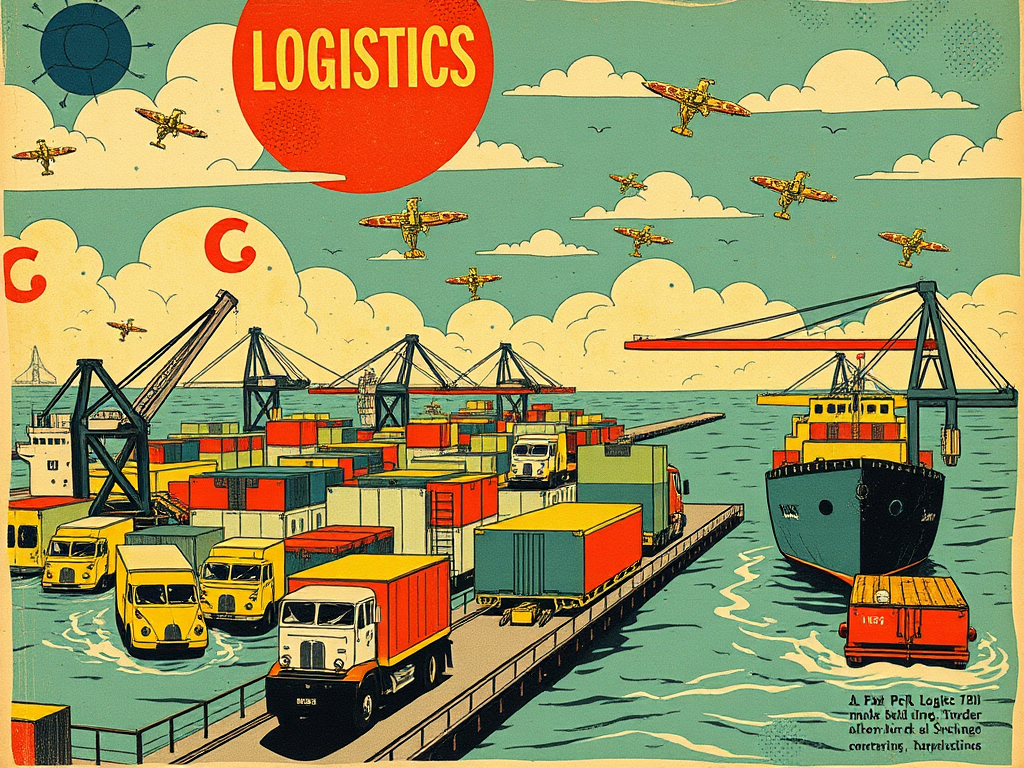
Greece as a Logistics Hub: Leveraging Ports and Transport for Regional Trade
Reading time: 15 minutes
Table of Contents
- Introduction
- Greece’s Strategic Geographic Position
- Port Infrastructure and Development
- Multimodal Transportation Network
- Investment in Logistics Facilities
- Digital Transformation in Greek Logistics
- Economic Impact and Future Prospects
- Challenges and Opportunities
- Conclusion
- FAQs
1. Introduction
In recent years, Greece has been positioning itself as a key logistics hub for regional and international trade. This transformation is not merely a result of its strategic geographic location but also stems from concerted efforts to modernize infrastructure, streamline processes, and attract foreign investment. As we delve into this comprehensive analysis, we’ll explore how Greece is leveraging its ports and transport networks to become a pivotal player in the global supply chain.
The evolution of Greece’s logistics sector is intrinsically tied to broader economic trends, including shifts in global trade patterns, technological advancements, and changing consumer behaviors. By examining these factors alongside Greece’s strategic initiatives, we can gain valuable insights into the country’s potential as a logistics powerhouse and its implications for regional economic growth.
2. Greece’s Strategic Geographic Position
Greece’s location at the crossroads of Europe, Asia, and Africa has long been recognized as a significant asset. However, it’s only in recent years that the country has begun to fully capitalize on this geographical advantage in the context of modern global trade.
2.1 Maritime Crossroads
Greece’s extensive coastline and numerous islands make it a natural maritime hub. The country’s position along major shipping routes connecting the Mediterranean, Black Sea, and Suez Canal provides an ideal gateway for goods entering and exiting Europe. This strategic location reduces transit times and costs for shipping companies, making Greek ports increasingly attractive for international trade.
2.2 Land Bridge to Europe
Beyond its maritime advantages, Greece serves as a crucial land bridge connecting Southeast Europe with the rest of the continent. This positioning is particularly valuable for overland transport routes, offering more direct access to European markets for goods arriving from Asia and the Middle East.
3. Port Infrastructure and Development
At the heart of Greece’s logistics strategy lies its port infrastructure. Significant investments and modernization efforts have transformed Greek ports into competitive, state-of-the-art facilities capable of handling increasing cargo volumes.
3.1 Piraeus Port: A Success Story
The Port of Piraeus stands out as a shining example of Greece’s port development strategy. Following substantial investment and management by COSCO Shipping, Piraeus has risen to become one of the busiest container ports in Europe. Its rapid growth and increased efficiency have made it a model for other Greek ports seeking to enhance their competitiveness.
3.2 Emerging Regional Ports
While Piraeus captures headlines, other Greek ports are also undergoing significant upgrades. Ports such as Thessaloniki, Alexandroupolis, and Igoumenitsa are expanding their capacities and improving their infrastructure to handle diverse cargo types and attract international shipping lines.
4. Multimodal Transportation Network
Greece’s logistics strategy extends beyond its ports, encompassing a comprehensive multimodal transportation network that facilitates seamless cargo movement across different modes of transport.
4.1 Rail Network Expansion
Recognizing the importance of efficient inland transportation, Greece has been investing heavily in its rail network. The ongoing expansion and modernization of rail lines, particularly those connecting major ports to key industrial centers and international borders, are crucial for enhancing Greece’s logistics capabilities.
4.2 Road Infrastructure Improvements
Complementing rail developments, Greece has also focused on upgrading its road infrastructure. New highways and improved connections between ports, industrial areas, and neighboring countries are reducing transit times and increasing the reliability of overland transport.
5. Investment in Logistics Facilities
To support its ambitions as a logistics hub, Greece has been actively promoting the development of modern logistics facilities and industrial parks.
5.1 Free Trade Zones and Bonded Warehouses
The establishment of free trade zones and bonded warehouses near major ports and transport nodes offers significant advantages for companies engaged in international trade. These facilities provide tax and customs benefits, encouraging businesses to use Greece as a distribution center for the wider region.
5.2 Logistics Parks and Distribution Centers
Strategic investments in logistics parks and distribution centers are creating integrated ecosystems for supply chain operations. These facilities, equipped with state-of-the-art technology and designed for operational efficiency, are attracting both domestic and international logistics operators.
6. Digital Transformation in Greek Logistics
Greece’s logistics sector is not just about physical infrastructure; it’s also embracing digital transformation to enhance efficiency and competitiveness.
6.1 Port Community Systems
The implementation of advanced port community systems is streamlining operations and improving communication between various stakeholders in the logistics chain. These digital platforms reduce paperwork, speed up processes, and increase overall port efficiency.
6.2 Blockchain and IoT Applications
Greek logistics companies and port authorities are exploring innovative technologies such as blockchain and the Internet of Things (IoT) to improve supply chain visibility, enhance security, and reduce operational costs.
7. Economic Impact and Future Prospects
The development of Greece as a logistics hub is having a significant impact on the country’s economy and its future prospects.
7.1 Job Creation and Economic Growth
The expansion of the logistics sector is creating new job opportunities and contributing to economic growth. From port workers to logistics specialists, the industry is becoming a major employer in Greece.
7.2 Foreign Direct Investment
Greece’s emerging status as a logistics hub is attracting increased foreign direct investment. International companies are showing growing interest in establishing regional distribution centers and logistics operations in Greece, further boosting the economy.
8. Challenges and Opportunities
While Greece has made significant strides in developing its logistics capabilities, challenges remain. These include regulatory hurdles, competition from other regional hubs, and the need for continued investment in infrastructure and technology.
However, these challenges also present opportunities. By addressing regulatory issues, Greece can create a more business-friendly environment. Continuous innovation and strategic partnerships can help Greece maintain its competitive edge. Moreover, the country’s property for sale in greece offers attractive investment opportunities for logistics companies looking to establish a presence in this emerging hub.
9. Conclusion
Greece’s transformation into a regional logistics hub represents a significant shift in the country’s economic landscape. By leveraging its strategic geographic position, investing in modern infrastructure, and embracing digital innovation, Greece is positioning itself as a key player in global supply chains.
The success of this strategy will depend on continued commitment to infrastructure development, regulatory reforms, and adaptation to evolving trade patterns and technologies. As Greece continues to enhance its logistics capabilities, it not only strengthens its own economy but also contributes to more efficient and resilient supply chains across the region.
The journey of Greece as a logistics hub is still unfolding, but the progress made thus far and the potential for future growth make it a compelling case study in economic transformation and strategic positioning in the global trade landscape.
10. FAQs
-
Q: How has the Port of Piraeus contributed to Greece’s logistics sector growth?
A: The Port of Piraeus has been a cornerstone of Greece’s logistics sector growth. Since its privatization and management by COSCO Shipping, it has seen significant increases in container throughput, becoming one of Europe’s busiest ports. This success has attracted more shipping lines, increased efficiency, and served as a model for other Greek ports, contributing substantially to the country’s overall logistics capabilities.
-
Q: What role does Greece’s geographic location play in its logistics strategy?
A: Greece’s strategic geographic location at the crossroads of Europe, Asia, and Africa is crucial to its logistics strategy. This position allows Greece to serve as a natural gateway for goods entering Europe from the East, offering shorter transit times and potentially lower costs for shipping companies. Additionally, its location makes it an ideal distribution hub for the Balkans and Southeast Europe.
-
Q: How is digital transformation impacting Greece’s logistics sector?
A: Digital transformation is playing a significant role in enhancing Greece’s logistics sector. The implementation of port community systems is streamlining operations and improving communication between stakeholders. Additionally, emerging technologies like blockchain and IoT are being explored to improve supply chain visibility, enhance security, and reduce operational costs, making Greek logistics more efficient and competitive.
-
Q: What are some challenges facing Greece’s development as a logistics hub?
A: While Greece has made significant progress, challenges remain. These include regulatory hurdles that can slow down processes, competition from other regional logistics hubs, the need for continued infrastructure investment, and the importance of keeping pace with technological advancements. Addressing these challenges will be crucial for Greece to fully realize its potential as a logistics hub.
-
Q: How is Greece’s logistics sector development impacting its economy?
A: The development of Greece’s logistics sector is having a positive impact on the country’s economy. It’s creating new job opportunities across various skill levels, from port workers to logistics specialists. Additionally, it’s attracting foreign direct investment as international companies show interest in establishing regional distribution centers in Greece. This growth is contributing to overall economic development and helping diversify Greece’s economy.

Article reviewed by Anna Mayer, Residential Property Investment Advisor | Luxury Market Specialist, on April 1, 2025
